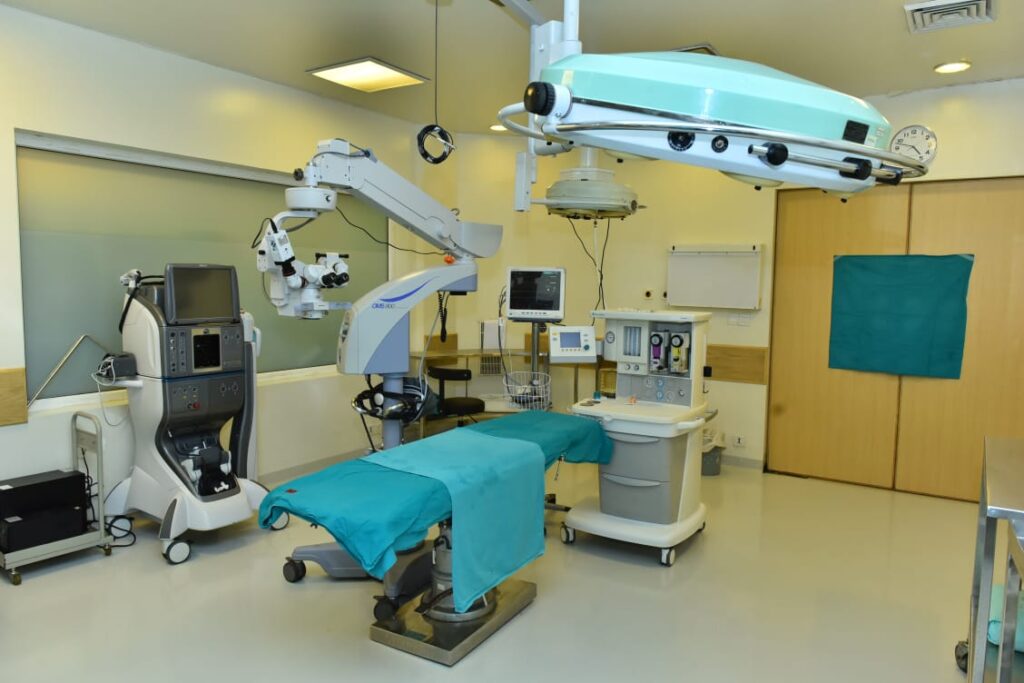Are you tired of wearing glasses or contact lenses? LASIK surgery may be the solution you’ve been looking for. It is a safe and effective procedure that can correct common vision problems such as nearsightedness, farsightedness, and astigmatism. However, choosing the right LASIK surgeon is crucial to ensure the best possible outcome and minimize the risks involved. In this article, we will walk you through the process of finding the best LASIK surgeon and provide you with valuable tips to make an informed decision.
Understanding LASIK Surgery
Before diving into the factors to consider when selecting a LASIK surgeon, it is important to understand what surgery LASIK is and how it works. LASIK, which stands for Laser-Assisted In Situ Keratomileusis, is a refractive eye surgery that reshapes the cornea to improve vision. It is a two-step process that involves creating a thin flap in the cornea using a femtosecond laser and then using an excimer laser to reshape the cornea and correct the vision problem.
What is LASIK Surgery?
LASIK surgery is a popular procedure that has been performed millions of times worldwide. It offers a quick and painless way to improve vision and reduce dependency on glasses or contact lenses. The surgery takes only a few minutes per eye and recovery is usually fast. However, not everyone is a suitable candidate for LASIK surgery, so it is important to consult with a qualified surgeon to determine if you are eligible.
During the LASIK procedure, the patient’s eye is numbed with eye drops to ensure comfort throughout the surgery. The femtosecond laser creates a thin flap in the cornea, which is painless and allows for quick healing post-surgery. The excimer laser then reshapes the cornea with precision, correcting nearsightedness, farsightedness, and astigmatism.
The Importance of Choosing the Right Surgeon
Choosing the right LASIK surgeon is crucial to ensure a successful outcome and minimize the risks associated with the procedure. A skilled and experienced surgeon will have the expertise to determine if you are a suitable candidate, perform the surgery with precision, and provide proper post-operative care. On the other hand, an inexperienced or poorly trained surgeon might compromise your safety and significantly increase the chances of complications.
It is essential to research potential LASIK surgeons thoroughly before making a decision. Look for a surgeon who is board-certified, has a high success rate, and utilizes the latest technology in their practice. Additionally, reading patient reviews and testimonials can provide valuable insights into the surgeon’s reputation and patient satisfaction levels.
Factors to Consider When Choosing a LASIK Surgeon
Surgeon’s Experience and Qualifications
One of the most important factors to consider when choosing a LASIK surgeon is their experience and qualifications. Look for a surgeon who has performed a substantial number of LASIK procedures and has a proven track record of success. It is also important to verify their qualifications and certifications, ensuring that they are board-certified and have received specialized training in refractive surgery.
Furthermore, consider the surgeon’s involvement in research and academic contributions to the field of ophthalmology. Surgeons who are actively engaged in research and education often bring a wealth of knowledge and expertise to their practice, staying abreast of the latest advancements in LASIK techniques.
Technology and Equipment Used
Another crucial factor to consider is the technology and equipment used by the surgeon. LASIK technology has advanced significantly in recent years, and newer technologies offer greater precision and better outcomes. Look for a surgeon who uses state-of-the-art equipment and stays up-to-date with the latest advancements in LASIK technology.
In addition to the technology used during the procedure, inquire about the pre-operative and post-operative care provided by the surgeon. A comprehensive approach that includes thorough pre-operative evaluations and personalized post-operative care can contribute to a smoother recovery and optimal visual outcomes.

Patient Reviews and Recommendations
Reading patient reviews and testimonials can provide valuable insights into the quality of care provided by a LASIK surgeon. Look for reviews from patients who have undergone LASIK surgery with the surgeon you are considering. Pay attention to their overall satisfaction, the clarity of their vision post-surgery, and the overall experience they had throughout the process.
Additionally, seek recommendations from trusted sources such as family members, friends, or optometrists who may have insights into the reputation and patient outcomes of the LASIK surgeon. Personal referrals can offer firsthand accounts of the surgeon’s bedside manner, communication style, and overall patient satisfaction beyond what online reviews may provide.
Questions to Ask Your Potential LASIK Surgeon
Inquiring About Surgeon’s Experience
During your initial consultation, don’t hesitate to ask your potential LASIK surgeon about their experience with the procedure. Inquire about the number of LASIK surgeries they have performed and their success rate. A seasoned surgeon will be happy to share this information with you and address any concerns you may have.
Furthermore, it can be beneficial to ask about the specific types of LASIK procedures the surgeon is proficient in, such as traditional LASIK, wavefront-optimized LASIK, or bladeless LASIK. Understanding the surgeon’s expertise in different techniques can help you make an informed decision about your vision correction options.
Understanding the Procedure and Risks
It is important to have a clear understanding of the LASIK procedure and the potential risks involved. Ask your surgeon to explain the entire process, including the pre-surgery evaluation, the surgery itself, and the follow-up care. Inquire about the potential risks and complications associated with LASIK surgery and how they are mitigated.
Additionally, inquire about the technology and equipment the surgeon uses during the procedure. Advanced technologies such as femtosecond lasers for creating the corneal flap and excimer lasers for reshaping the cornea can enhance the precision and safety of the surgery, leading to better outcomes for patients.
Discussing the Expected Outcome and Recovery
Before undergoing LASIK surgery, it is crucial to discuss the expected outcome and the recovery process. Ask your surgeon about the likely improvement in your vision and the timeline for recovery. It is important to have realistic expectations and understand that the final results may vary from person to person.
Furthermore, inquire about any post-operative care instructions and follow-up appointments that will be necessary for monitoring your progress. Understanding the recovery process and the expected post-operative care can help you prepare for a smooth and successful LASIK experience.

Preparing for Your LASIK Surgery
Pre-Surgery Consultation
Prior to your LASIK surgery, you will have a consultation with your surgeon to assess your eligibility for the procedure. This initial meeting is an important step in ensuring that you are well-informed and prepared for the surgery ahead. During this consultation, your surgeon will evaluate your eye health, measure your refractive error, and discuss the benefits and risks of LASIK surgery. They will also provide you with pre-operative instructions to prepare you for the surgery.
Health Evaluation and Eye Examination
As part of the preparation for LASIK surgery, your surgeon will conduct a thorough health evaluation and eye examination. This comprehensive assessment is designed to gather all the necessary information about your eyes and overall health, ensuring that you are a suitable candidate for the procedure. The evaluation may involve testing your corneal thickness, pupil size, and the overall health of your eyes. These evaluations help determine your suitability for the procedure and ensure that no underlying eye conditions or health issues would pose a risk during or after the surgery.
Setting Realistic Expectations
Setting realistic expectations is an essential aspect of preparing for LASIK surgery. While LASIK can significantly improve your vision, it is important to understand that it may not provide perfect vision or eliminate the need for glasses or contact lenses entirely. During your consultation, it is crucial to have an open and honest discussion with your surgeon about your expectations. They will provide a clear understanding of what can be achieved through the surgery, taking into account your unique eye characteristics and refractive error.
Choosing the best LASIK surgeon is a crucial step towards achieving improved vision and reducing your dependency on glasses or contact lenses. The expertise and skill of your surgeon play a significant role in the success of your LASIK surgery. When selecting a surgeon, consider factors such as their experience and qualifications, the technology and equipment used, and patient reviews. By thoroughly researching and evaluating these aspects, you can make an informed decision and feel confident in your choice of surgeon.
Additionally, asking relevant questions during your consultation is an important part of the preparation process. Don’t hesitate to inquire about the surgeon’s success rate, their experience with similar cases, and any potential risks or complications associated with the procedure. By gathering all the necessary information, you can alleviate any concerns or uncertainties you may have, allowing you to approach the surgery with peace of mind.
Remember, your eyes are precious, and entrusting them to a skilled and experienced LASIK surgeon is worth the effort. By following the pre-operative instructions provided, attending all necessary appointments, and maintaining open communication with your surgeon, you are taking proactive steps towards a successful LASIK experience. Soon, you will be able to enjoy the freedom of clear vision and a life without the constant reliance on glasses or contact lenses.
Related: Options to Enhance Your Vision with Custom LASIK Surgery

